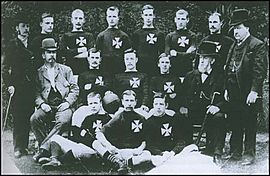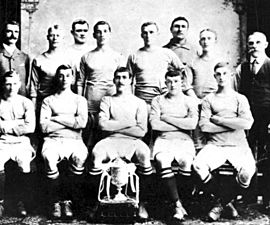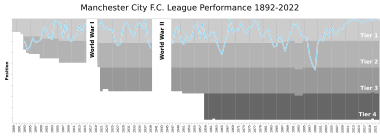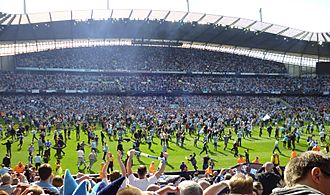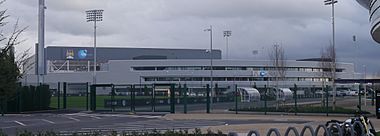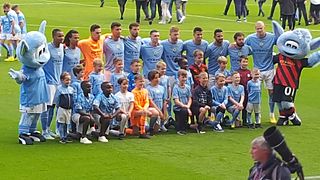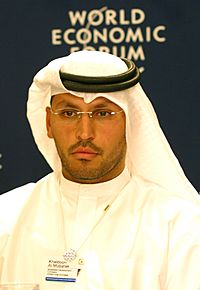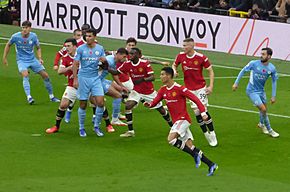Manchester City F.C. facts for kids
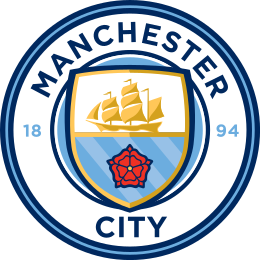 |
||
| Full name | Manchester City Football Club | |
|---|---|---|
| Nickname(s) | The Citizens (Cityzens) The Blues The Sky Blues |
|
| Short name | Man City City |
|
| Founded | 1880 as St. Mark's (West Gorton) | |
| Ground | City of Manchester Stadium | |
| Capacity | 53,400 | |
| Coordinates | 53°29′00″N 2°12′01″W / 53.4832°N 2.2003°W | |
| Owner | City Football Group Limited | |
| Chairman | Khaldoon Al Mubarak | |
| Manager | Pep Guardiola | |
| League | Premier League | |
| 2018–19 | Premier League, 1st of 20 (champions) | |
|
|
||
Manchester City Football Club is a professional football team from Manchester, England. They play in the Premier League, which is the top football league in England.
The club started in 1880 as St. Mark's (West Gorton). Later, they became Ardwick Association Football Club in 1887. In 1894, they changed their name to Manchester City. Their home stadium is the Etihad Stadium in east Manchester. They moved there in 2003, after playing at Maine Road since 1923.
Manchester City wears sky blue home shirts, a tradition since 1894. They are one of the most successful teams in English football. They have won many important trophies. These include ten league titles, seven FA Cups, and eight League Cups. They have also won the UEFA Champions League once and the FIFA Club World Cup once.
The club joined the Football League in 1892. Their first major trophy was the FA Cup in 1904. Manchester City had a very successful period in the late 1960s and early 1970s. They won the league title, FA Cup, League Cup, and a European Cup Winners' Cup. This was under managers Joe Mercer and Malcolm Allison.
After a tough time in the 1980s and 1990s, the club even dropped to the third tier of English football in 1998. They returned to the top league in 2002. Since then, they have stayed in the Premier League.
In 2008, Sheikh Mansour bought Manchester City. This brought a lot of money and started a new era of success. They won the FA Cup in 2011 and the Premier League in 2012. This was their first league title since the 1960s.
Under manager Pep Guardiola, City won the league in 2018 with a record 100 points. In 2019, they became the first English men's team to win all four main domestic trophies in one season. They won the league four times in a row from 2021 to 2024. City reached their first Champions League final in 2021. They won the competition for the first time in 2023. This made them the second English club to win the continental treble (league, FA Cup, and Champions League).
Manchester City was the football club with the highest earnings in the world in 2022. They are owned by City Football Group Limited. This company is mostly owned by the Abu Dhabi United Group.
Contents
Club History: From Early Days to Today
Early Years and First Trophies
City won their first trophy, the Second Division, in 1899. This meant they moved up to the top league in English football. On 23 April 1904, they won their first major trophy, the FA Cup. They beat Bolton Wanderers 1–0. City almost won both the league and the cup that season. They were the first club in Manchester to win a major honour.
After this success, the club faced problems with money. Many players were suspended in 1906, including captain Billy Meredith. He then moved to Manchester United. A fire destroyed their stadium, Hyde Road, in 1920. In 1923, the club moved to their new stadium, Maine Road.
In the 1930s, Manchester City played in two FA Cup finals in a row. They lost in 1933 but won in 1934, beating Portsmouth. During the 1934 cup run, a record 84,569 fans watched them play Stoke City at Maine Road. This was the highest home attendance for any English club until 2016.
The club won the First Division title for the first time in 1937. But they were relegated the next season, even though they scored more goals than any other team. Twenty years later, City reached two more FA Cup finals in 1955 and 1956. They lost the first but won the second. In the 1956 final, City goalkeeper Bert Trautmann famously kept playing after breaking his neck.
Golden Era and Later Challenges
After being relegated in 1963, the club had a tough time. In 1965, Joe Mercer and Malcolm Allison became the new management team. In their first season, Manchester City won the Second Division title. They also signed important players like Mike Summerbee and Colin Bell.
Two seasons later, in 1968, City won the league championship for the second time. They beat their rivals Manchester United on the last day of the season. More trophies followed. City won the FA Cup in 1969. A year later, they won the European Cup Winners' Cup, beating Górnik Zabrze 2–1. This was their only European trophy until 2023. They also won the League Cup that year. This made them the second English team to win a European and a domestic trophy in the same season.
The club continued to compete for trophies in the 1970s. They finished just one point behind the league champions twice. They also reached the League Cup final in 1974. A famous match from this time was against rivals Manchester United in 1974. Former United player Denis Law scored for City, which helped send United down to a lower league. City won their last trophy of this successful period in 1976, beating Newcastle United in the League Cup final.
After the 1960s and 1970s, the club went through a long period of decline. They were relegated from the top league twice in the 1980s. They returned to the top league in 1989. City was one of the founding teams of the Premier League in 1992. However, they struggled and were relegated again in 1996. After two seasons in the First Division, City reached their lowest point in 1998. They were relegated to the third tier of English football.
Recovery and New Ownership
After being relegated, the club started to recover. Under manager Joe Royle, City won promotion back to the second tier in 1999. They then won another promotion to return to the top division. However, they were relegated again in 2001.
Kevin Keegan became manager and immediately led the team back to the top division in 2002. They broke club records for points and goals scored. The 2002–03 season was their last at Maine Road. They had a great 3–1 derby win over Manchester United, ending a 13-year wait for a derby victory. City also qualified for European competition for the first time in 25 years. In 2003, the club moved to the new City of Manchester Stadium.
In 2008, the Abu Dhabi United Group bought Manchester City. This takeover brought a lot of money to the club. They immediately signed high-profile players like Robinho for a British record fee. The team finished tenth in the league that season. In December 2009, Roberto Mancini became manager. City finished fifth in the Premier League in 2010, just missing out on the Champions League.
The Modern Golden Era with Pep Guardiola
The club continued to invest in players, and results quickly improved. In 2011, City reached the FA Cup final for the first time in over 30 years. They beat rivals Manchester United in the semi-finals. City then defeated Stoke City 1–0 in the final, winning their first major trophy since 1976. They also qualified directly for the Champions League group stage.
The 2011–12 season was very exciting. City had big wins, including a 6–1 victory over Manchester United at Old Trafford. They were eight points behind United with six games left. But United lost form, and City won all their remaining games. On the final day, City needed to beat Queens Park Rangers. They were losing 1–2 in injury time. However, two late goals, including one by Sergio Agüero, gave City the title. They won the Premier League on goal difference, a first for the league.
In the 2012–13 season, City finished second in the league and lost the FA Cup final. Manager Mancini was replaced by Manuel Pellegrini. In Pellegrini's first year, City won the League Cup and the Premier League title again on the last day of the season. The team's league form then dipped slightly over the next two years. However, they won another League Cup in 2016 and reached the Champions League semi-finals for the first time.
Pep Guardiola, a famous coach from Barcelona and Bayern Munich, became Manchester City's new manager in 2016. His first season was without a trophy. But the 2017–18 season was incredibly successful. City won the Premier League title with a record 100 points. They broke many club and English league records.
This was the start of an amazing period for Manchester City under Guardiola. Between 2018 and 2024, City won six out of seven league titles. They also won the League Cup four times in a row from 2018 to 2021. In the 2018–19 season, City achieved a historic "domestic treble." This means they won the Premier League, FA Cup, and League Cup in the same season. They also won the Community Shield, holding all four major English trophies at once.
On the European stage, the club reached their first-ever Champions League final in 2021. They lost 0–1 to Chelsea.
The 2022–23 season was the best in the club's history. Manchester City won their third Premier League title in a row. They also won the FA Cup final against rivals Manchester United. Most importantly, they won their first Champions League title against Inter Milan. This completed a rare "continental treble" (league, FA Cup, and Champions League). On their way to the Champions League win, they beat European giants Bayern Munich and Real Madrid.
In the 2023–24 season, City won the UEFA Super Cup and FIFA Club World Cup for the first time. They also became the first English men's club to win four league titles in a row. City reached the FA Cup final again but lost to Manchester United.
The 2024–25 season saw City win the Community Shield against United. They also reached their third FA Cup final in a row but lost to Crystal Palace.
Manchester City has faced questions about following financial rules. In 2020, a sports court said that UEFA's punishments against the club were not fair. In 2023, the Premier League started its own investigation into these financial rules.
League History Overview
Manchester City has played in different divisions throughout its history.
- 1892–1899: Division 2 (Level 2)
- 1899–1902: Division 1 (Level 1)
- 1902–1903: Division 2 (Level 2)
- 1903–1909: Division 1 (Level 1)
- 1909–1910: Division 2 (Level 2)
- 1910–1926: Division 1 (Level 1)
- 1926–1928: Division 2 (Level 2)
- 1928–1938: Division 1 (Level 1)
- 1938–1947: Division 2 (Level 2)
- 1947–1950: Division 1 (Level 1)
- 1950–1951: Division 2 (Level 2)
- 1951–1963: Division 1 (Level 1)
- 1963–1966: Division 2 (Level 2)
- 1966–1983: Division 1 (Level 1)
- 1983–1985: Division 2 (Level 2)
- 1985–1987: Division 1 (Level 1)
- 1987–1989: Division 2 (Level 2)
- 1989–1992: Division 1 (Level 1)
- 1992–1996: Premier League (Level 1)
- 1996–1998: Division 1 (Level 2)
- 1998–1999: Division 2 (Level 3)
- 1999–2000: Division 1 (Level 2)
- 2000–2001: Premier League (Level 1)
- 2001–2002: Division 1 (Level 2)
- 2002–present: Premier League (Level 1)
Club Badge and Colours
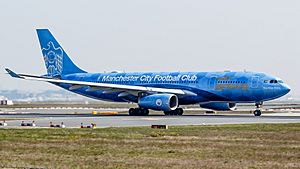
Manchester City's home colours are sky blue and white. Their away kits have often been maroon or red and black. The club has worn blue since at least 1892. Early reports from 1884 say the team wore black shirts with a white cross. This showed their beginnings as a church team.
The use of red and black away colours came from former assistant manager Malcolm Allison. He believed that wearing the colours of AC Milan would help City win. This seemed to work, as City won several trophies in red and black stripes in the late 1960s and early 1970s.
City has had different badges on their shirts. The first modern badge, from 1970, had a ship and the club's name in a circle. The ship is from the City of Manchester coat of arms. In 1972, a red rose of Lancashire was added to the badge.
For major cup finals, the club used to wear shirts with the City of Manchester coat of arms. This showed their pride in representing the city.
A new club badge was introduced in 1997. This badge was based on the arms of the city of Manchester. It featured a shield in front of a golden eagle. The eagle is an old symbol of Manchester. The shield showed a ship, representing the Manchester Ship Canal. Three diagonal stripes stood for the city's three rivers: the Irwell, Irk, and Medlock. The badge also had the Latin motto "Superbia in Proelio", meaning "Pride in Battle."
In 2015, fans were asked about the badge. The club decided to bring back a circular design, similar to older badges. The new circular badge was officially revealed in December 2015.
Kit Suppliers and Shirt Sponsors
| Period | Kit supplier | Shirt sponsor (chest) | Shirt sponsor (sleeve) |
|---|---|---|---|
| 1974–1982 | Umbro | No sponsor | No sponsor |
| 1982–1984 | Saab | ||
| 1984–1987 | Philips | ||
| 1987–1997 | Brother | ||
| 1997–1999 | Kappa | ||
| 1999–2002 | Le Coq Sportif | Eidos | |
| 2002–2003 | First Advice | ||
| 2003–2004 | Reebok | ||
| 2004–2007 | Thomas Cook | ||
| 2007–2009 | Le Coq Sportif | ||
| 2009–2013 | Umbro | Etihad Airways | |
| 2013–2017 | Nike | ||
| 2017–2019 | Nexen Tire | ||
| 2019–2023 | Puma | ||
| 2023–present | OKX |
Players and Staff
First-Team Squad
|
|
Retired Numbers
Since 2003, Manchester City has not used the squad number 23. This number was retired to remember Marc-Vivien Foé. He was playing for the club when he sadly passed away on the field in 2003.
|
Club Captains
The club captain is chosen by a vote from players and staff. Other players might lead the team if the captain is not playing.
|
|
||||||||||||||||||||||||||||||||||||||||||||||||||||||||||||||
|
|
|
Player of the Year Awards
Each season, the Manchester City Official Supporters Club votes for their best player. Here are the winners since 2000:
|
|
|
Club Management and Coaching
Executive Team
| Position | Name |
|---|---|
| Chairman | |
| Chief Executive Officer | |
| Director of Football | |
| Club ambassadors |
Coaching Staff
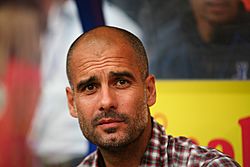
| Position | Name |
|---|---|
| Manager | |
| Assistant managers | |
| Fitness coach | |
| Head of goalkeeping | |
| Goalkeeper coach | |
| Performance analysis coach | |
| Set-piece coach | |
| Head of player support | |
| Head of academy | |
| Under-23 EDS manager | |
| Under-23 EDS assistant manager | |
| Under-23 GK coach | |
| Under-18 Academy manager | |
| Under-18 Academy assistant manager | |
| Under-18 Academy assistant manager | |
| Under-18 Academy GK coach | |
| Chief scout |
Successful Managers
Here are the Manchester City managers who have won major trophies:
| Name | From | To | Matches | Wins | Draws | Loss | Win % | Honours | |
|---|---|---|---|---|---|---|---|---|---|
|
|
1902 | 1906 | 150 | 89 | 22 | 39 | 59.33 | 1903–04 FA Cup | |
|
|
1932 | 1946 | 352 | 158 | 71 | 123 | 44.89 | 1933–34 FA Cup | 1936–37 First Division |
|
|
1950 | 1963 | 592 | 220 | 127 | 245 | 37.16 | 1955–56 FA Cup | |
|
|
1965 | 1971 | 340 | 149 | 94 | 97 | 43.82 | 1967–68 First Division 1968 FA Charity Shield 1968–69 FA Cup |
1969–70 European Cup Winners' Cup 1969–70 League Cup |
|
|
1973 | 1980 | 269 | 114 | 75 | 80 | 42.38 | 1975–76 League Cup | |
|
|
2009 | 2013 | 191 | 113 | 38 | 40 | 59.16 | 2010–11 FA Cup 2011–12 Premier League |
2012 FA Community Shield |
|
|
2013 | 2016 | 167 | 100 | 28 | 39 | 59.88 | 2013–14 League Cup 2013–14 Premier League |
2015–16 League Cup |
|
|
2016 | incumbent | 533 | 376 | 77 | 80 | 70.54 | 2017–18 League Cup 2017–18 Premier League 2018 FA Community Shield 2018–19 League Cup 2018–19 Premier League 2018–19 FA Cup 2019 FA Community Shield 2019–20 League Cup 2020–21 League Cup |
2020–21 Premier League 2021–22 Premier League 2022–23 Premier League 2022–23 FA Cup 2022–23 UEFA Champions League 2023 UEFA Super Cup 2023 FIFA Club World Cup 2023–24 Premier League 2024 FA Community Shield |
Supporters and Traditions
Since moving to the City of Manchester Stadium, City's average attendance has been among the top six in England. Even when they were in the third tier of English football in the late 1990s, around 30,000 fans still came to home games.
Manchester City's official supporters club is the Manchester City F.C. Supporters Club (1949). The fans' favourite song is "Blue Moon". City supporters often believe their team is unpredictable. They call unexpected results "typical City." For example, City is the only English champion ever to be relegated (in 1938).
In the late 1980s, City fans started a fun trend of bringing inflatable objects, especially oversized bananas, to matches. This craze spread to other clubs too. In 2010, Manchester City supporters adopted a dance called The Poznań. They learned it from fans of Polish club Lech Poznań.
Rivalries
Manchester City's biggest rivalry is with their neighbours, Manchester United. This match is called the Manchester derby. In the past, many fans in Manchester watched both teams. But as travel became easier and tickets cost more, the rivalry grew stronger. Some people say City fans are from Manchester city, while United fans are from outside. Studies show that more City season ticket holders live in Manchester.
In recent years, Manchester City has also developed a big rivalry with Liverpool. This is now considered one of the biggest rivalries in football. Their modern rivalry started in the 2010s. City beat Liverpool to the 2014 league title by just two points. In 2016, City defeated Liverpool in the League Cup final.
The two clubs first met in European competition in the 2018 Champions League quarter-finals. Liverpool won and went on to reach the final. In the 2019 Premier League season, City won the title again on the final day. Both teams had very high points totals. The next season, Liverpool won the title. City then won the title again in 2021 and 2022, beating Liverpool in another close race.
The success of both teams has created a rivalry between their managers, Jürgen Klopp (Liverpool) and Pep Guardiola (Manchester City). Guardiola has called Klopp's Liverpool team "the strongest opponents I have faced." In a 2019 survey, City fans said Liverpool was their biggest rival, even more than Manchester United.
Manchester City also has local rivalries with Bolton Wanderers, Oldham Athletic, and Stockport County. They also have Premier League rivalries with Tottenham Hotspur, Chelsea, and Arsenal.
Club Ownership and Finances
Manchester City Limited is the company that owns Manchester City. The club has been privately owned since 2007. That year, Thaksin Shinawatra, a former prime minister of Thailand, bought most of the shares.
In 2008, the Abu Dhabi United Group bought Manchester City. This deal was reportedly worth £200 million. It led to the club signing many expensive players. For example, they signed Robinho for a British record fee of £32.5 million. The new owners' wealth meant City could spend more than any other Premier League club on players in 2009.
City Football Group
The City Football Group (CFG) was created in 2013. It manages the global football interests of the Abu Dhabi United Group. CFG owns parts of many football clubs around the world. This helps them share resources, develop young players, and market the clubs.
Clubs Owned by CFG
Besides Manchester City, City Football Group owns parts of these clubs:
 Melbourne City (Australia)
Melbourne City (Australia) Yokohama F. Marinos (Japan)
Yokohama F. Marinos (Japan) New York City FC (USA)
New York City FC (USA) Montevideo City Torque (Uruguay)
Montevideo City Torque (Uruguay) Girona (Spain)
Girona (Spain) Shenzhen Peng City (China)
Shenzhen Peng City (China) Mumbai City (India)
Mumbai City (India) Lommel (Belgium)
Lommel (Belgium) Troyes (France)
Troyes (France) Palermo (Italy)
Palermo (Italy) Bahia (Brazil)
Bahia (Brazil)
Partner Clubs
CFG also has partner clubs, like:
 Club Bolívar (Bolivia)
Club Bolívar (Bolivia) Vannes (France)
Vannes (France)
Stadium Information
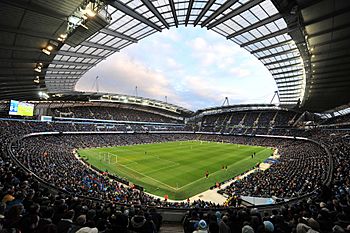
The City of Manchester Stadium is in east Manchester. It is known as the Etihad Stadium because of a sponsorship deal since 2011. Manchester City leases the stadium from the Manchester City Council. It has been the club's home since 2003. Before moving, the club spent over £30 million to change it for football. They lowered the pitch and added more seats. The first match there was a 2–1 win against Barcelona in a friendly game.
In 2015, a new section of seats was added, increasing the stadium's capacity to 55,097. There are plans to expand the North Stand, which could make the capacity around 61,000. This expansion is expected to open for the 2025–26 season. The project also includes a hotel and new offices.
Before the Etihad, the club played at five different stadiums between 1880 and 1887. Then they settled at Hyde Road Football Stadium for 36 years. A fire destroyed the main stand there in 1920. In 1923, the club moved to the 84,000-capacity Maine Road. Maine Road was called the "Wembley of the North." It held the largest-ever crowd at an English club ground: 84,569 fans for an FA Cup game in 1934. Maine Road was used for 80 years before the move to the City of Manchester Stadium in 2003.
Club Honours and Achievements
Manchester City is one of the most successful teams in England. They have won 36 major domestic, European, and worldwide trophies. This places them fourth among English clubs.
Their first major trophy was the FA Cup in 1904. Their first top league title came in the 1936–37 season. They won their first League Cup and European trophy in the 1969–70 season. This was also their first "double" (winning two major trophies in one season). In the 2018–19 season, City became the first team to win all four major English trophies in a single season. This included the Premier League, FA Cup, League Cup, and Community Shield.
The 1970 Cup Winners' Cup was City's only European trophy for a long time. Then, they won the 2022–23 UEFA Champions League in 2023. They have reached the Champions League semi-finals four times. They won the UEFA Super Cup and FIFA Club World Cup in 2023.
Manchester City has won the second division title seven times. Their first win was in 1899, and the most recent was in 2002.
| Type | Competition | Titles | Seasons |
|---|---|---|---|
| Domestic | First Division/Premier League | 10 | 1936–37, 1967–68, 2011–12, 2013–14, 2017–18, 2018–19, 2020–21, 2021–22, 2022–23, 2023–24 |
| Second Division | 7 | 1898–99, 1902–03, 1909–10, 1927–28, 1946–47, 1965–66, 2001–02 | |
| FA Cup | 7 | 1903–04, 1933–34, 1955–56, 1968–69, 2010–11, 2018–19, 2022–23 | |
| Football League Cup/EFL Cup | 8 | 1969–70, 1975–76, 2013–14, 2015–16, 2017–18, 2018–19, 2019–20, 2020–21 | |
| FA Charity Shield/FA Community Shield | 7 | 1937, 1968, 1972, 2012, 2018, 2019, 2024 | |
| Continental | UEFA Champions League | 1 | 2022–23 |
| European Cup Winners' Cup | 1 | 1969–70 | |
| UEFA Super Cup | 1 | 2023 | |
| Worldwide | FIFA Club World Cup | 1 | 2023 |
Winning Multiple Trophies in a Season
- Doubles (winning two major trophies)
- League and UEFA Champions League (1): 2022–23
- League and FA Cup (2): 2018–19, 2022–23
- League and League Cup (4): 2013–14, 2017–18, 2018–19, 2020–21
- League Cup and European Cup Winners' Cup (1): 1969–70
- Continental Treble (League, FA Cup, and UEFA Champions League)
- 1: 2022–23
- Domestic Treble (League, FA Cup, and League Cup)
- 1: 2018–19
Club Records
- Biggest league win – 11–3 vs Lincoln City (1895); 10–0 vs Darwen (1899)
- Biggest FA Cup win – 12–0 vs Liverpool Stanley (1890)
- Biggest European win – 7–0 vs Schalke 04 (2019); 7–0 vs RB Leipzig (2023)
- Biggest league defeat – 0–8 vs Burton Wanderers (1894); 0–8 vs Wolverhampton Wanderers (1933); 1–9 vs Everton (1906); 2–10 vs Small Heath (1893)
- Biggest FA Cup defeat – 0–6 vs Preston North End (1897); 2–8 vs Bradford Park Avenue (1946)
- Biggest European defeat – 0–4 vs Barcelona (2016)
- Highest home attendance – 84,569 vs Stoke City (1934)
- Most league appearances – 561, Alan Oakes, 1958–76
- Most European / worldwide appearances – 83, Bernardo Silva, 2017–present
- Most appearances overall – 680, Alan Oakes, 1958–76
- Most goals scored overall – 260, Sergio Agüero, 2011–21
- Most goals scored in a season – 52, Erling Haaland, 2022–23
- Record transfer fee paid – £100 million for Jack Grealish, August 2021
- Record transfer fee received – £82 million from Atlético Madrid for Julián Álvarez, August 2024
See also
 In Spanish: Manchester City Football Club para niños
In Spanish: Manchester City Football Club para niños
 | William M. Jackson |
 | Juan E. Gilbert |
 | Neil deGrasse Tyson |


